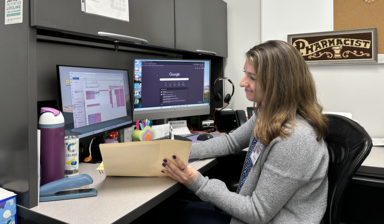Throughout her year as a PGY1 resident at Greenwood Pharmacy in Waterloo, Iowa, Destanie Truman (’24 PharmD) learned two important lessons.
The first?
“It really is all about the patient,” she said.
As a resident in the PGY1 Community-based Pharmacy Residency Program — offered through the University of Iowa (UI) College of Pharmacy — Truman immersed herself in all facets of community pharmacy, supporting patients however she could.
“Coming into an independent pharmacy gives you more autonomy to do so and make those decisions to help them,” she shared.
She also came away with a renewed sense of confidence in her abilities.
“I can do more than I think I can,” she said. “Having mentors here who’ve pushed me throughout this last year has built my confidence.”
Now, Truman is bringing that confidence back to Greenwood Pharmacy, where she’s been hired as a full-time pharmacist.
She encourages any student interested in the Community-based Pharmacy Residency Program to keep an open mind about the different types of pharmacy settings available. While community pharmacies are often seen as mostly focused on dispensing, Truman discovered they provide significant direct patient care, like administering vaccines.
An Established Residency Program
The Community-based Pharmacy Residency Program is the longest continually accredited community pharmacy residency in the nation. Established and first accredited in 1997, the program is a collaboration between the college and innovative community practice sites across Iowa.
Designed to help graduate pharmacists develop specialized clinical skills, the program immerses residents in community pharmacy settings where they can grow as both clinicians and leaders. Since its inception, 127 pharmacists have completed the PGY1 Community-based Pharmacy Residency Program.
Currently, the program partners with four sites across the state: Greenwood Pharmacy in Waterloo, MercyOne Pharmacy in Dubuque, Osterhaus Pharmacy in Maquoketa, and Towncrest Pharmacy in Iowa City.
At each of these sites, residents learn to deliver advanced patient care, implement pharmacist-led clinical services, and build leadership strategies that drive both personal and professional development through education and mentorship.
One recent PGY1 resident, Emilie Heggen (’24 PharmD), completed her residency at Towncrest Pharmacy in Iowa City, where she focused on managing the clinical medication synchronization program.
“The most important thing that I’ve learned through my residency that’s prepared me for a future in pharmacy is managing a team and a workflow,” Heggen shared. “It’s allowed me to effectively learn how to manage time, as well as other people.”

She also developed the skills to communicate with other healthcare providers, families, and the patients themselves.
“We’re not just caring for the patients — it’s a whole team effort, including their caregivers,” Heggen said. “Learning how to communicate effectively is a large strength I’ve found.”
Reaccreditation Continues Program’s Credibility
Recently, the Community-based Pharmacy Residency Program received reaccreditation from the American Society of Health-System Pharmacists (ASHP).
The year-long accreditation process involves surveyors meeting with the program director, program preceptors, current and past residents, and college administration to assess the program’s adherence to the ASHP Regulations and Accreditation Standards. (The Community-based Residency Program received no non-compliances.) The process also includes a voting phase by the ASHP Commission on Credentialing, which approved the reaccreditation for eight years—the maximum length granted.
ASHP sets its accreditation standards as an “optimal standard” rather than a baseline or minimum. This encourages residency programs and practice sites to aim for a high level of practice and excellence.
Stevie Veach, director of the Community-based Pharmacy Residency Program, explained that being accredited by the ASHP means students can say they’ve graduated from an accredited residency, which some jobs and post-graduate training opportunities require. Many students seek out institutions with accreditation for that reason.
“For the college, the accreditation highlights its high level of excellence,” Veach said. “It’s a peer-reviewed process so it shows the college offers high-quality training for its residents.”